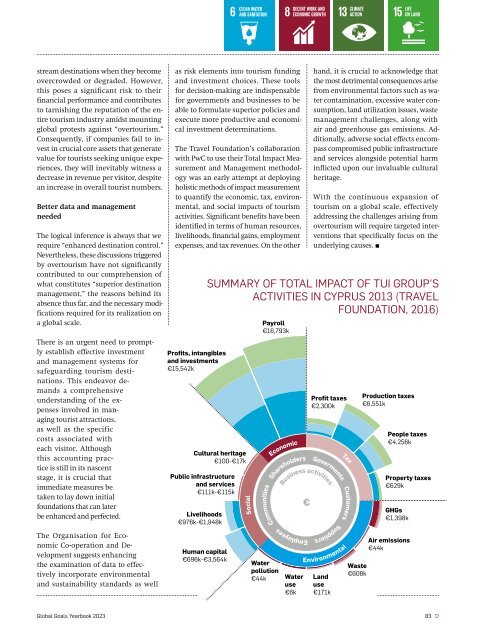Global Goals Yearbook 2023 makes SDG impact measurable
No poverty, no hunger, peace: In 2015, the United Nations adopted the 17 Sustainable Development Goals, which were supposed to make the world a better place by 2030. Now it is half-time. The results are sobering. In the remaining time, measures must be more targeted and more effective. On the occasion of COP28 in Dubai, the Global Goals Yearbook is focusing on the aspect of impact.
No poverty, no hunger, peace: In 2015, the United Nations adopted the 17 Sustainable Development Goals, which were supposed to make the world a better place by 2030. Now it is half-time. The results are sobering. In the remaining time, measures must be more targeted and more effective. On the occasion of COP28 in Dubai, the Global Goals Yearbook is focusing on the aspect of impact.
Create successful ePaper yourself
Turn your PDF publications into a flip-book with our unique Google optimized e-Paper software.
stream destinations when they become<br />
overcrowded or degraded. However,<br />
this poses a significant risk to their<br />
financial performance and contributes<br />
to tarnishing the reputation of the entire<br />
tourism industry amidst mounting<br />
global protests against “overtourism.”<br />
Consequently, if companies fail to invest<br />
in crucial core assets that generate<br />
value for tourists seeking unique experiences,<br />
they will inevitably witness a<br />
decrease in revenue per visitor, despite<br />
an increase in overall tourist numbers.<br />
Better data and management<br />
needed<br />
The logical inference is always that we<br />
require “enhanced destination control.”<br />
Nevertheless, these discussions triggered<br />
by overtourism have not significantly<br />
contributed to our comprehension of<br />
what constitutes “superior destination<br />
management,” the reasons behind its<br />
absence thus far, and the necessary modifications<br />
required for its realization on<br />
a global scale.<br />
There is an urgent need to promptly<br />
establish effective investment<br />
and management systems for<br />
safeguarding tourism destinations.<br />
This endeavor demands<br />
a comprehensive<br />
understanding of the expenses<br />
involved in managing<br />
tourist attractions,<br />
as well as the specific<br />
costs associated with<br />
each visitor. Although<br />
this accounting practice<br />
is still in its nascent<br />
stage, it is crucial that<br />
immediate measures be<br />
taken to lay down initial<br />
foundations that can later<br />
be enhanced and perfected.<br />
The Organisation for Economic<br />
Co-operation and Development<br />
suggests enhancing<br />
the examination of data to effectively<br />
incorporate environmental<br />
and sustainability standards as well<br />
as risk elements into tourism funding<br />
and investment choices. These tools<br />
for decision-making are indispensable<br />
for governments and businesses to be<br />
able to formulate superior policies and<br />
execute more productive and economical<br />
investment determinations.<br />
The Travel Foundation’s collaboration<br />
with PwC to use their Total Impact Measurement<br />
and Management methodology<br />
was an early attempt at deploying<br />
holistic methods of <strong>impact</strong> measurement<br />
to quantify the economic, tax, environmental,<br />
and social <strong>impact</strong>s of tourism<br />
activities. Significant benefits have been<br />
identified in terms of human resources,<br />
livelihoods, financial gains, employment<br />
expenses, and tax revenues. On the other<br />
Profits, intangibles<br />
and investments<br />
€15,542k<br />
Public infrastructure<br />
and services<br />
€111k-€115k<br />
Livelihoods<br />
€976k-€1,948k<br />
Human capital<br />
€696k-€3,564k<br />
Payroll<br />
€16,793k<br />
hand, it is crucial to acknowledge that<br />
the most detrimental consequences arise<br />
from environmental factors such as water<br />
contamination, excessive water consumption,<br />
land utilization issues, waste<br />
management challenges, along with<br />
air and greenhouse gas emissions. Additionally,<br />
adverse social effects encompass<br />
compromised public infrastructure<br />
and services alongside potential harm<br />
inflicted upon our invaluable cultural<br />
heritage.<br />
With the continuous expansion of<br />
tourism on a global scale, effectively<br />
addressing the challenges arising from<br />
overtourism will require targeted interventions<br />
that specifically focus on the<br />
underlying causes.<br />
SUMMARY OF TOTAL IMPACT OF TUI GROUP’S<br />
ACTIVITIES IN CYPRUS 2013 (TRAVEL<br />
FOUNDATION, 2016)<br />
Cultural heritage<br />
€100-€17k<br />
Social<br />
Communities<br />
Water<br />
pollution<br />
€44k<br />
Economic<br />
Shareholders<br />
Water<br />
use<br />
€6k<br />
Profit taxes<br />
€2,300k<br />
Business activities<br />
Employees<br />
€<br />
Goverments<br />
Suppliers<br />
Land<br />
use<br />
€171k<br />
Tax<br />
Customers<br />
Environmental<br />
Waste<br />
€608k<br />
Production taxes<br />
€6,551k<br />
People taxes<br />
€4,256k<br />
Property taxes<br />
€629k<br />
GHGs<br />
€1,398k<br />
Air emissions<br />
€44k<br />
<strong>Global</strong> <strong>Goals</strong> <strong>Yearbook</strong> <strong>2023</strong> 83
















